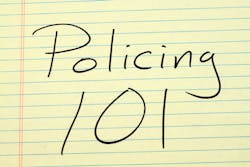Community Policing in Today's World
I remember, oh so well, in the early '90s when "Community Policing" became the new buzzword in law enforcement how so many agencies all of a sudden started teaching classes for the subject. As a person who had been a municipal police officer for my entire police career to that point, I couldn't for the life of me figure out why agencies who dealt with HUGE jurisdictions felt they should be teaching classes on something COMMUNITY oriented. Let me explain.
Freely admitting that I was never around to see beat officers walking their couple of blocks of a given jurisdiction I can only assume that this was the closest an officer ever came to true Community Oriented Policing. These officers intimately knew the neighborhood they patrolled; they knew the good guys, bad guys, problem kids, challenged parents, friendly shop keepers, dodgy liquor store owners, etc. The key was that they KNEW what they needed to know and could therefore spot anything out of place before it became a big problem.
Those police officers were well known in their areas and had earned respect from those they protected and served. Whether it was respect based on fear or respect based on appreciation and character, they were respected. That respect from the people gave the officers the ability to arbitrate problems and disagreements. It also gave them the ability to ask citizens to do things that could ultimately make the area safer and more friendly - or at least avoid problems before they arose.
Why do I bring this up now? Because the big push for Community Policing is decades old and it may be more valuable to us now than ever before. Why? Because now more than ever our police officers and other law enforcement officials need to be intimately familiar with our neighborhoods, their patrol sectors, beats, etc.
With acts of mass violence escalating (mall, church, bus and school shootings?), the local officer is in a much better position to know about the problem person BEFORE that person flicks off. The local officer is in a much better position to say, "Hey - we'd better watch this guy. Sarge? Make sure everyone is wearing their plates tonight and has their rifle loaded." The local officer KNOWS.
And it doesn't just apply to the "random actor" of violence. It also applies to the professional criminal, the terrorist forward observer, the local psycho, etc. The strength of the Community Oriented Police officer is what he knows and how well he knows it - without having to stop and analyze a bunch of correlated data gathered from other officers. He knows instinctively because he's there day in and day out and he FEELS what is going on.
For that very reason I just didn't get it when the State Police - who primarily do highway patrol work in my state - were teaching Community Policing. It didn't make any more sense to me than the FBI teaching it. It's not that either organization isn't top notch (because they are) but how much does either do in small neighborhoods? How many of the instructors teaching the program had walked (or rode) a beat that encompassed ten square blocks or less for any significant period of time? To me, the municipal officers who worked in small towns ALWAYS were doing community oriented policing. It was the nature of having a small jurisdiction.
So, as I sit working on a manual about immediate response to critical incidents, intended for the patrol officer, I have had to consider the value of community-oriented policing today and how it can be applied. Certainly School Resource Officers are the equivalent of a Community Oriented Police Officer in the school. They know their neighborhood. They know the good, the bad and the ugly. They know who will cause problems before the problems occur. Most of the time they can prevent those problems. Small town officers all over our country face similar situations - and all of them are perfectly positioned to prevent problems before they occur.
However, they ALL must be empowered to do so. What do I mean? Their policy, general orders, standard operating procedures, leadership, management, etc. - everything they take into consideration when they make decisions must support their ability to take whatever legal action is necessary to prevent a problem from occurring, most especially if the "problem" will involve the death(s) of anyone.
With all that said, what do you think? If you're a deputy or officer, does your agency empower you to take the necessary action(s) to prevent or resolve such problems? If you're a citizen, does your local public safety agency (police or sheriff) empower their patrol troops to prevent or resolve such problems?
If not… why not and how do you change that? Get started today.
About the Author
Lt. Frank Borelli (ret), Editorial Director
Editorial Director
Lt. Frank Borelli is the Editorial Director for the Officer Media Group. Frank brings 25+ years of writing and editing experience in addition to 40 years of law enforcement operations, administration and training experience to the team.
Frank has had numerous books published which are available on Amazon.com and other major retail outlets.
If you have any comments or questions, you can contact him via email at [email protected].

